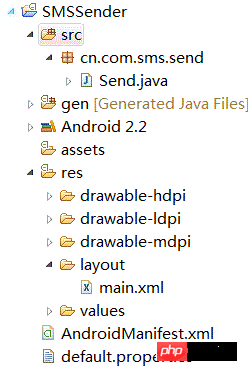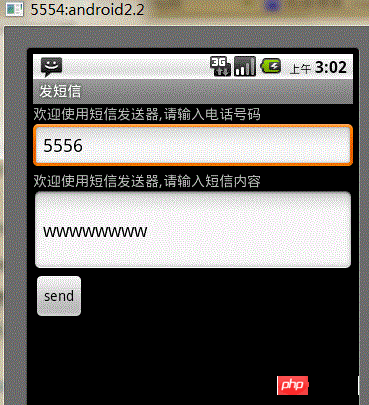这篇文章主要介绍了Android开发中实现发送短信的小程序示例,文中还附带了一个监听广播接收者的升级版短信发送例子,需要的朋友可以参考下

上图为代码结构图。
现在我们看下具体的代码。
Send.java
package cn.com.sms.send;
import java.util.ArrayList;
import java.util.Iterator;
import android.app.Activity;
import android.app.PendingIntent;
import android.content.Intent;
import android.os.Bundle;
import android.telephony.SmsManager;
import android.util.Log;
import android.view.View;
import android.widget.Button;
import android.widget.EditText;
import android.widget.Toast;
public class Send extends Activity {
private String message;
private String number ;
private EditText editText;
private EditText editText2;
@Override
public void onCreate(Bundle savedInstanceState) {
super.onCreate(savedInstanceState);
setContentView(R.layout.main);
editText = (EditText) this.findViewById(R.id.number);
editText2 = (EditText)this.findViewById(R.id.message);
Button button = (Button)this.findViewById(R.id.button);
button.setOnClickListener(new View.OnClickListener() {
public void onClick(View v) {
number = editText.getText().toString();
message = editText2.getText().toString();
// 在LogCat中可以查看到number和message的相关信息
Log.i("number", number);
Log.i("message", message);
/*获取系统默认的信息管理器,一定要注意的是SmsManager是android.telephony.SmsManager;这和
*我们使用的版本有关,在 Android 2.0 以前 应该使用 android.telephony.gsm.SmsManager
*Android 2.0 之后的版本应该用 android.telephony.SmsManager。
*/
SmsManager smsManager = SmsManager.getDefault();
/*PendingIntent.getBroadcast返回一个用于广播的PendingIntent对象,类似于调用Content.sendBroadcast();
*/
PendingIntent paIntent = PendingIntent.getBroadcast(Send.this, 0, new Intent("SMS_SENT"), 0);
PendingIntent deliveryIntent = PendingIntent.getBroadcast(Send.this, 0, new Intent("SMS_DELIVERED"), 0);
// smsManager.pideMessage有些时候短信如果超过了字数,我们就需要这个方法来帮我们拆分短信内容。
ArrayList<String> smses = smsManager.pideMessage(message);
Iterator<String> iterator = smses.iterator();
while(iterator.hasNext()){
String temp = iterator.next();
//发送短信
smsManager.sendTextMessage(number, null, temp, paIntent, deliveryIntent);
}
// 弹出一个浮动框显示提示内容,Toast.LENGTH_LONG代表浮动框显示时间的长短
Toast.makeText(Send.this, "短信发送完成", Toast.LENGTH_LONG).show();
}
});
}
}
main.xml
<?xml version="1.0" encoding="utf-8"?> <LinearLayout xmlns:android="http://schemas.android.com/apk/res/android" android:orientation="vertical" android:layout_width="fill_parent" android:layout_height="fill_parent" > <TextView android:layout_width="fill_parent" android:layout_height="wrap_content" android:text="欢迎使用短信发送器,请输入电话号码" /> <EditText android:id="@+id/number" android:layout_width="fill_parent" android:layout_height="wrap_content" android:hint="这里输入电话号码" /> <TextView android:layout_width="fill_parent" android:layout_height="wrap_content" android:text="欢迎使用短信发送器,请输入短信内容" /> <EditText android:id="@+id/message" android:layout_width="fill_parent" android:layout_height="wrap_content" android:minLines="3" android:hint="这里输入短信内容" /> <Button android:id="@+id/button" android:layout_width="wrap_content" android:layout_height="wrap_content" android:text="send" /> </LinearLayout>
AndroidManifest.xml
<?xml version="1.0" encoding="utf-8"?>
<manifest xmlns:android="http://schemas.android.com/apk/res/android"
package="cn.com.sms.send"
android:versionCode="1"
android:versionName="1.0">
<uses-sdk android:minSdkVersion="8" />
<uses-permission android:name="android.permission.SEND_SMS"></uses-permission>
<application android:icon="@drawable/icon" android:label="@string/app_name">
<activity android:name=".Send"
android:label="@string/app_name">
<intent-filter>
<action android:name="android.intent.action.MAIN" />
<category android:name="android.intent.category.LAUNCHER" />
</intent-filter>
</activity>
</application>
</manifest>最终效果图为:

和打电话小程序一样,这里也需要开启两个AVD才能进行功能测试。
碎碎念:
发短信应用的主要的类就是SmsManager。 在 Android 2.0 以前 应该使用 android.telephony.gsm.SmsManager
之后应该用 android.telephony.SmsManager;
SmsManager smsManager = SmsManager.getDefault();
意思为获取系统默认的信息管理器
smsManager.sendTextMessage(destinationAddress, scAddress, text, sentIntent, deliveryIntent)
-- destinationAddress:目标电话号码
-- scAddress:服务商的短信中心号码(例如中国移动的短信中心号码),测试可以不填。
-- text: 短信内容
-- sentIntent:发送 -->中国移动 --> 中国移动发送失败 --> 返回发送成功或失败信号 --> 后续处理 即,这个意图包装了短信发送状态的信息
-- deliveryIntent: 发送 -->中国移动 --> 中国移动发送成功 --> 返回对方是否收到这个信息 --> 后续处理 即:这个意图包装了短信是否被对方收到的状态信息(供应商已经发送成功,但是对方没有收到)。
public static PendingIntent getBroadcast (Context context, int requestCode, Intent intent, int flags)
返回一个用于广播的PendingIntent,类似于调用Context.sendBroadcast()函数
requestCode 暂时不用
intent 是用于广播的intent
flag 有:FLAG_ONE_SHOT, FLAG_NO_CREATE, FLAG_CANCEL_CURRENT, FLAG_UPDATE_CURRENT 用于设置新建的PendingIntent是使用一次、如无则不创建、取消当前、更新当前等属性。
此外,我们还要在AndroidManifest.xml中声明短信发送权限。
190b1c053ab202afc18a6d75e65b075b
有的时候,我们两个AVD进行模拟发短信时,会发现有时候该程序无法正常使用。系统会提示我们NO DNS servers found,找不到DNS服务。这种情况一般是由于你的电脑没有联入网络的原因造成的。
发送短信:
SmsManager smsMgr = SmsManager.getDefault(); smsMgr.sendTextMessage(address, null, message, null, null);
显示写短信界面:
Uri smsToUri = Uri.parse("smsto://10086");
Intent mIntent = new Intent( android.content.Intent.ACTION_SENDTO, smsToUri );
startActivity( mIntent );
发送电子邮件:
Intent i = new Intent(Intent.ACTION_SEND);
i.putExtra(Intent.EXTRA_EMAIL, address);
i.putExtra(Intent.EXTRA_SUBJECT, filename);
i.putExtra(Intent.EXTRA_STREAM, Uri.parse("file://" + filename)); ;
i.setType("text/csv");
startActivity(Intent.createChooser(i, "EMail File"));升级版:
该代码为其添加了广播接收者的监听。详细代码如下
package cn.com.sms.send;
import java.util.ArrayList;
import java.util.Iterator;
import android.app.Activity;
import android.app.PendingIntent;
import android.content.BroadcastReceiver;
import android.content.Context;
import android.content.Intent;
import android.content.IntentFilter;
import android.os.Bundle;
import android.telephony.SmsManager;
import android.util.Log;
import android.view.View;
import android.widget.Button;
import android.widget.EditText;
import android.widget.Toast;
public class Send extends Activity {
private String message;
private String number ;
private EditText editText;
private EditText editText2;
@Override
public void onCreate(Bundle savedInstanceState) {
super.onCreate(savedInstanceState);
setContentView(R.layout.main);
editText = (EditText) this.findViewById(R.id.number);
editText2 = (EditText)this.findViewById(R.id.message);
Button button = (Button)this.findViewById(R.id.button);
button.setOnClickListener(new View.OnClickListener() {
public void onClick(View v) {
number = editText.getText().toString();
message = editText2.getText().toString();
// 在LogCat中可以查看到number和message的相关信息
Log.i("number", number);
Log.i("message", message);
/*获取系统默认的信息管理器,一定要注意的是SmsManager是android.telephony.SmsManager;这和
*我们使用的版本有关,在 Android 2.0 以前 应该使用 android.telephony.gsm.SmsManager
*Android 2.0 之后的版本应该用 android.telephony.SmsManager。
*/
SmsManager smsManager = SmsManager.getDefault();
/*PendingIntent.getBroadcast返回一个用于广播的PendingIntent对象,类似于调用Content.sendBroadcast();
*/
PendingIntent paIntent = PendingIntent.getBroadcast(Send.this, 0, new Intent("SMS_SENT2"), 0);
PendingIntent deliveryIntent = PendingIntent.getBroadcast(Send.this, 0, new Intent("SMS_DELIVERED2"), 0);
// 注册一个BroadcastReceiver,当有匹配它的IntentFilter的Intent出现时,该方法会被触发
registerReceiver(new BroadcastReceiver(){
@Override
public void onReceive(Context context, Intent intent) {
int resultCode = getResultCode();
switch(resultCode){
case Activity.RESULT_OK:
Toast.makeText(getBaseContext(), "信息发送成功了哦、", Toast.LENGTH_LONG).show();
break;
default:
Toast.makeText(getBaseContext(), "信息发送失败了哦、", Toast.LENGTH_LONG).show();
}
}
}, new IntentFilter("SMS_SENT2"));
registerReceiver(new BroadcastReceiver() {
@Override
public void onReceive(Context context, Intent intent) {
Toast.makeText(getBaseContext(), "deliveryIntent", Toast.LENGTH_LONG).show();
Log.i("短信接收人是否查看信息", "看了");
}
}, new IntentFilter("SMS_DELIVERED2"));
// smsManager.pideMessage有些时候短信如果超过了字数,我们就需要这个方法来帮我们拆分短信内容。
ArrayList<String> smses = smsManager.pideMessage(message);
Iterator<String> iterator = smses.iterator();
while(iterator.hasNext()){
String temp = iterator.next();
//发送短信
smsManager.sendTextMessage(number, null, temp, paIntent, deliveryIntent);
}
// 弹出一个浮动框显示提示内容,Toast.LENGTH_LONG代表浮动框显示时间的长短
Toast.makeText(Send.this, "短信发送完成", Toast.LENGTH_LONG).show();
}
});
}
}main.xml与AndroidManifest.xml和前面的代码一样。
registerReceiver()用于注册广播接受者。该方法在Content中这样定义的。
public abstract Intent registerReceiver(BroadcastReceiver receiver,IntentFilter filter);系统如果查询到满足filter的广播,便会教给receiver,让其处理。一般都是在其onReceive()方法中处理。
如果不是在代码中主动通过registerReceiver()进行注册,那么就要从AndroidManifest.xml进行配置,代码如下
<receiver android:name="类名"> <intent-filter> <action android:name="接收者中Intent参数的action属性" /> </intent-filter> </receiver>
这里需要注意,在配置文件中activity标签和receiver标签是平级的。
在模拟器中发送中文会接收方出现乱码的问题,但是在真机中,就不会出现乱码的情况了。所以开发者只需要正常开发短信功能,不需要编码转换。
Atas ialah kandungan terperinci Android实现发送短信的小程序示例代码. Untuk maklumat lanjut, sila ikut artikel berkaitan lain di laman web China PHP!

Alat AI Hot

Undresser.AI Undress
Apl berkuasa AI untuk mencipta foto bogel yang realistik

AI Clothes Remover
Alat AI dalam talian untuk mengeluarkan pakaian daripada foto.

Undress AI Tool
Gambar buka pakaian secara percuma

Clothoff.io
Penyingkiran pakaian AI

AI Hentai Generator
Menjana ai hentai secara percuma.

Artikel Panas

Alat panas

Hantar Studio 13.0.1
Persekitaran pembangunan bersepadu PHP yang berkuasa

Versi Mac WebStorm
Alat pembangunan JavaScript yang berguna

MantisBT
Mantis ialah alat pengesan kecacatan berasaskan web yang mudah digunakan yang direka untuk membantu dalam pengesanan kecacatan produk. Ia memerlukan PHP, MySQL dan pelayan web. Lihat perkhidmatan demo dan pengehosan kami.

SublimeText3 Linux versi baharu
SublimeText3 Linux versi terkini

Notepad++7.3.1
Editor kod yang mudah digunakan dan percuma




